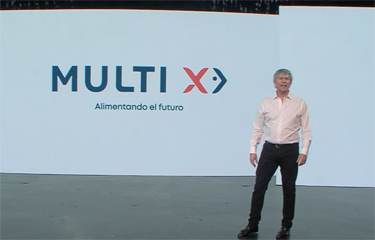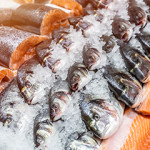Chilean salmon farmer Multiexport Foods rebrands as Multi X

Calling it “a new milestone in the history of Multiexport Foods,” executives at the Chilean salmon farmer announced a rebranding of the company as Multi X on Thursday, 2 September, emphasizing the company’s commitment to sustainable development and in defining products for different types of consumers around the world.
“We will keep the ‘Multi’ brand but integrate much of what defines us - eXtraordinary, eXperience, and eXquisito [‘delicious’ in Spanish]. Multiexport Foods is now Multi X,” the company’s executive president, Jose Ramon Gutierrez, said during a video presentation. “With this image, we will participate in a new era, in which we take on commitments that will define all that we do, in our productive processes, in our commercial processes, and in each team that forms part of the company.”
Gutierrez said the rebranding effort is a major step on the company’s growth plan, which he said is focused on innovation and increasing the value of its products.
“In our push to bring our salmon to the world’s consumers, showing the versatility of the product and drive its frequent consumption, we present a strong product brand architecture, looking to address the needs in each market, not just abroad but also in Chile with different products for the different needs,” he said.
Gutierrez reaffirmed Multi X’s commitment to achieving carbon neutrality by 2030, and said that in its community outreach the company is implementing a program that includes 1,800 hours annually of direct community engagement between employees and the neighbors of the 22 boroughs and 38 localities where the salmon farmer operates. Multi X CEO Christian Swett reiterated the company’s message of sustainability.
“The world is facing new challenges and new opportunities,” he said, referencing climate change and the challenge of feeding a global population that is slated to grow to 8.5 billion by 2030. “Responsible, animal-based protein farming in the sea is part of the solution for a better future. We are convinced that salmon is the protein of the future, and farming it in a responsible way is our mission.”
Swett highlighted the company’s decision to end farming operations in Chile’s freshwater lakes, and its move to terminate shipments of processing waste from plants to landfills under its Zero Waste to Landfill project. Swett said the company’s efforts on sustainabity show in it being the world’s only salmon farmer listed on the Coller FAIRR Protein Producer Index and the Dow Jones Sustainability Index.
Together with the rebranding, the company took the opportunity to launch what Swett called its “renewed purpose that will be the base of all that we do here and in the future, which addresses our responsibility towards future challenges: feeding the future, taking care of the world with a product that is healthy, nutritious, and versatile.
“We will produce the best salmon while reducing our impact and without altering the world’s rhythm,” he said.
That commitment includes maintaining sustainability at the center of business, incorporating environmental stewardship and connection with the surrounding communities, as well as continuously improving on planning, management, and efficiency throughout the value chain, while focusing on innovation and best practices, he said.
The Chilean salmon farmer is currently building a land-based recirculating aquaculture system (RAS) in the Pargua sector of Chile’s Los Lagos region that is expected to produce more than four million post-smolts of up to 500 grams in its first stage. The RAS hatchery, dubbed Multisea, is being developed under a 50-50 joint venture with Sealand Aquaculture, which is currently the Chilean firm’s largest smolt supplier. Multisea’s first expected production is slated for the third quarter of 2022, with capacity at 2,000 metric tons per year, equivalent to 6.5 million smolts between 170 and 500 grams.
For the financing of the project, a total USD 26 million (EUR 21.8 million) will be taken as debt, with another USD 10 million (EUR 8.4 million) in direct investment. Through the project, Multiexport is looking to provide smolts to its operations in Chile’s Magallanes region and reduce its dependence on third-parties in the supply of smolts. The smolts that will be produced by the Multisea facility will be larger than currently used, which the company has said will improve their health and speed their grow-out.
Founded in 1987, Puerto Montt-based Multiexport Foods has more than 2,400 employees and handles some 100,000 metric tons of salmon a year, with expectations to increase this to 125,000 metric tons by 2023. It has productive activities in southern Chile’s regions IX, X, XI, and XII and is present throughout the salmon production chain from reproduction to distribution to more than 30 countries.
Photo courtesy of Multi X






Share